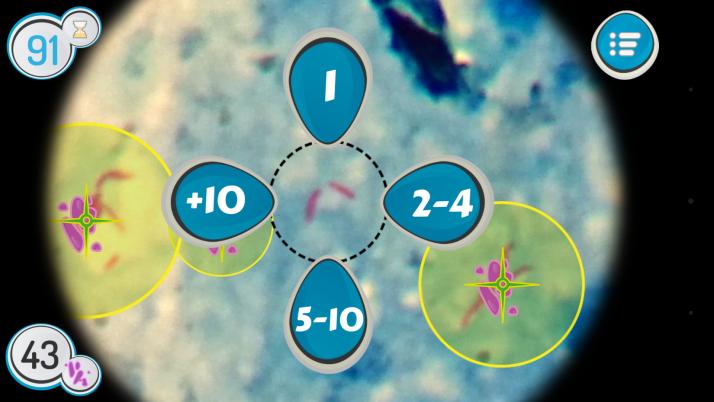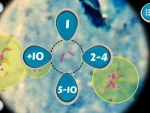
Campus Moncloa
Campus of International Excellence
An online game to help diagnose tuberculosis
Researchers from the Universidad Politécnica de Madrid within the framework of Moncloa Campus for the i-Health cluster developed a mobile phone app to help diagnose tuberculosis. The game TuberSpot has been launched on World Tuberculosis Day, March 24, 2015. Tuberculosis is a curable disease, but it continues to kill over a million and a half people per year around the world.
24/03/2015
Every week, people around the world play over 3 billion hours of videogames. What if, instead of shooting aliens or stealing cars, playing these games helped diagnose diseases? This opportunity is the foundation of TuberSpot, an online game that has been launched on World Tuberculosis Day.
TuberSpot players help analyze real digitized sputum samples, however no previous medical knowledge is needed to play the game. TuberSpot has been developed by researchers from the Technical University of Madrid.

‘Tuberspot is a proof-of-concept experiment to test the viability of collective tele-diagnosis, and establish a community of citizens scientists able to help diagnose tuberculosis online,’ says Sara Gil, Tuberspot project coordinator. ‘TuberSpot is the first worldwide crowdsourcing campaign focusing on tuberculosis samples.’
Detecting tuberculosis from home
The standard way to diagnose tuberculosis is to examine samples of sputum (a liquid expelled when coughing) with a microscope and then identify and count bacilli (bacteria that causes tuberculosis). To make a diagnosis, a specialist needs to examine an average of 100 images, a process that can take up to 20 minutes. TuberSpot distributes this time-consuming task amongst many different players. In the game, real sample images are shown to the players to ‘hunt’ the bacilli before the time is up.
TuberSpot’s vision goes even further: to develop a microscopy system on a mobile phone to allow telediagnosis. This is the first time the distribution of images via the internet from remote areas is possible, and this could enable the designing of a quick low-cost telediagnosis system with large-scale expansion possibilities. In fact, the sample images from the game have been digitalized and transmitted with a phone connected to a microscope, a low-cost system designed to be used in any part of the world
In 2013, the TuberSpot research team developed the first medical ‘crowdnosis’ game called MalariaSpot. Players identify malaria parasites in images of blood samples, leading to diagnosis. Over 12,000 MalariaSpot games have been played by volunteers from 100 different countries, showing that a combination of parasites identified in the same image by 22 players can provide a result as accurate as that of a single specialist.
‘Millions of hours are invested in playing videogames every day, especially by young people, and this turns them into digital experts. A tiny percentage of that time could be enough to diagnose every case of tuberculosis in the world,’ explains Dr. Miguel Luengo-Oroz, an Ashoka Fellow and principal investigator of the project. ‘TuberSpot is a simple experiment which will allow us to continue exploring the opportunities that collaborative games and social networks can offer us to tackle global health issues’,
TuberSpot has been developed in the Biomedical Image Technologies lab from the ETIS Telecommunications of the Universidad Politécnica de Madrid (International Excellence Campus Moncloa). The project has been executed in collaboration with the Innovation Unit and the Microbiology Unit of the San Carlos Clinical hospital in Madrid, the Technology for Human Development Innovation Center in the Technical University of Madrid and the Biomedical Research Networking center in Bioengineering, Biomaterials and Nanomedicine (CIBER-BBN). The project has been partially funded by the Spanish Science and Technology Foundation FECYT in the development of scientific, technological and innovative culture program.
Link to the Android application:
https://play.google.com/store/apps/details?id=com.spotlab.TuberSpot
Tag: i-Health Source: Tuberspot
Event date:
24/03/2015
Tuberspot

